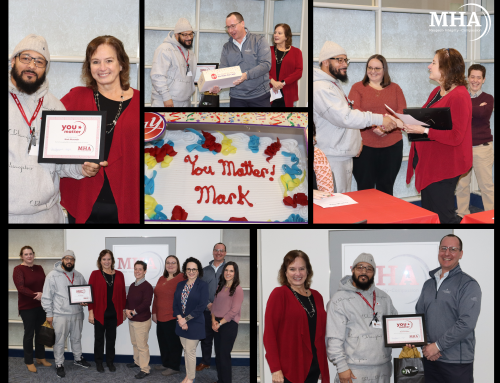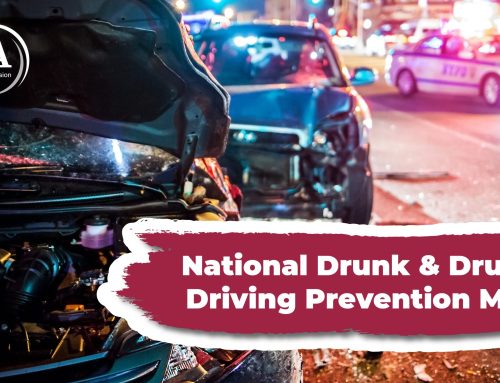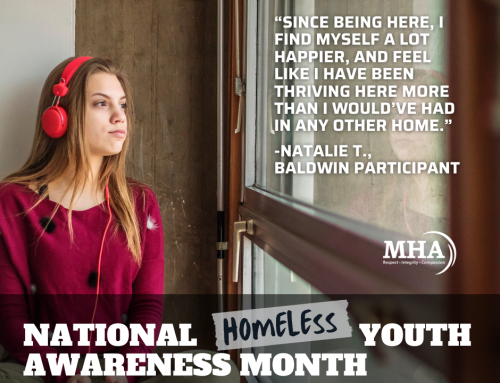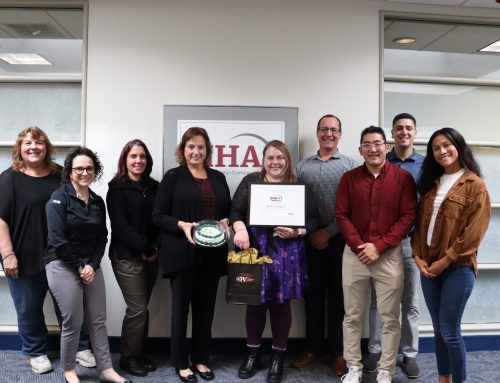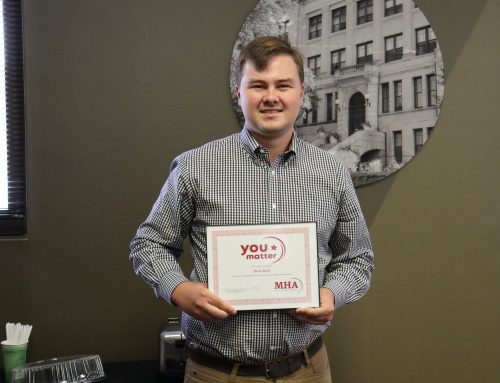Dallas Clark has lived experience with addiction, and also with recovery. He’s applying that experience, along with specialized training, to support others in overcoming barriers to their recovery.
“Iron sharpens iron,” Dallas explained. “You can’t do it on your own. You need the right team around you, a supportive team with people who are there for the right reasons. Where we used to rely on alcohol or drugs, now we rely on each other. To develop those skills of recovery we have to ask each other for support. If you just want me to listen, I’ll listen. If you want a conversation, I’ll talk. Just don’t isolate yourself. There will be obstacles and you have to face yours and confront them. I fought hard to get where I am today. I’m not going to let anyone take that away, and I’m here to support the people who have chosen to be here at GRIT to win their fight, too.”
Dallas is a Recovery Coach at GRIT, one of the 26 new Residential Rehabilitation Services programs located across the Commonwealth. Funded and licensed by the Bureau of Substance Abuse Services, GRIT includes three programs awarded to MHA (two in Springfield and one in Holyoke). GRIT programs are for people who have both a substance use disorder and a moderate-to-severe mental health diagnosis (sometimes described as “co-occurring” or “dual diagnosis” disorders).
The 26 new programs are a state-wide response to the opioid crisis, which has been described as a pandemic affecting all ethnicities, social and economic classes . According to official Massachusetts Department of Public Health statistics, there were approximately 2,000 opioid-related overdose deaths in the state in 2018. During just the first 3 months of 2019, there were approximately 500 opioid-related deaths. The overall opioid death rate in the state fell 4% from 2017 to 2018, which is good news, but the cities of Springfield, Chicopee and Holyoke all saw increases in opioid-related deaths over the same period. GRIT is responding to a need that is real and local.
MHA developed GRIT so people can learn to overcome the barriers to achieving stable, long-term recovery from addiction. GRIT’s curriculum is based on an Integrated Dual Diagnosis Treatment, which provides multidisciplinary support and education to teach residents how mental health and addiction influence and affect each other. Clinical mental health and addiction counselors teach GRIT residents skills to effectively cope with symptoms without relying on substances. In addition to clinical treatment, residential staff educate and inform residents on how to develop a relapse prevention plan that will be transferrable to the community after they leave GRIT.
“GRIT is a hopeful place and a safe place,” said Dallas. “Having a safe place is so important for the beginnings of recovery. Peers can support each other, and recovery coaches like me can provide support because we’ve been where they are now and moved ahead in our recovery. One way I’m helping myself in my own recovery is by being a Recovery Coach. It puts a lot of eyes on me, which keeps me accountable while I support others.”
Dallas said he sought that accountability because he’s an example of how someone raised in a good home can end up in a very bad place. “I grew up in a good home,” Dallas recalled. “But at about 13 or 14 years old I got involved in the street and I became a product of that environment. I wanted to be part of that clique, I wanted to get the attention. Things progressed and I sold drugs, then I used drugs, and then I got incarcerated. It was a struggle for me. I wanted to do the right thing but I didn’t know how to do the right thing. Eventually I saw a different light. I have many of the same problems as before, but now I have better solutions. I’m learning new skills and I’m supporting others who are getting started in their recovery.”
How did Dallas get where he is now? It started the day he decided to fight for his recovery. “I’ve been in recovery since October 17, 2017.” (Like many people in recovery, Dallas knows the exact day he decided to break free and commit to the life-long fight to stay clean.) “That day was a renewing of the mind, a rebirth so to speak. It’s so meaningful, that day, like another birthday. Ever since that day, a lot of people have been supporting me. My 12-step sponsor, my therapist, my recovery coach, my peers and my family. It’s a tough fight and you’ve got to want it. Are you willing to go to any length to overcome the barriers? You have to be. Are you going to put the same energy you used to put into wanting that drug or that bottle of alcohol, and put it instead into fighting for your recovery? You have to because recovery is even harder. Each day I have to make it through this one day and I can’t be complacent. I have to beat the disease of addiction. It can always come back if it I get complacent. I can’t take even one drink. I won’t take it.”
Dallas said that recovery demands a change of lifestyle. “Instead of being around a group of people living in the street, I stepped out of that and into a group that is committed to recovery,” he explained. “It can be uncomfortable for people to make that change, but now as I move further in my recovery I constantly meet new people who have better habits and behaviors. The most important parts of recovery are changing your lifestyle and the way you think.”
As Dallas moved into long-term recovery, he realized he could be a change agent for others, so he volunteered to support others in early recovery. That experience helped him land a new career as a Recovery Coach with GRIT. “Being a Recovery Coach is about integrity,” he said proudly. “I have to lead by example.
When I first got into being a Recovery Coach, a mentor said to me, ‘Are you ready to wear this suit? Are people going to be able to rely on you?’ I now have the integrity, and holding others accountable keeps me accountable. It keeps me grounded. I am willing to give and take constructive criticism, just like in business.”
Dallas emphasized the distinction between helping people and supporting them. “I’m not helping people, they have to help themselves,” he said. “That’s important to understand. Everyone at GRIT is here because they chose to be here. It’s voluntary. I’m here because I want to support others in their fight, and honestly it’s good for me because of all the eyes that are on me. So to people in the community who may wonder about a program like GRIT, especially if it’s in their neighborhood, I ask, do you want the new me or the old me? We are life-changers over here. I’m here on a team that is giving people who want to change their lives the opportunity to do it. We’re going to be here in the community, one way or the other, so how do you want us?”

